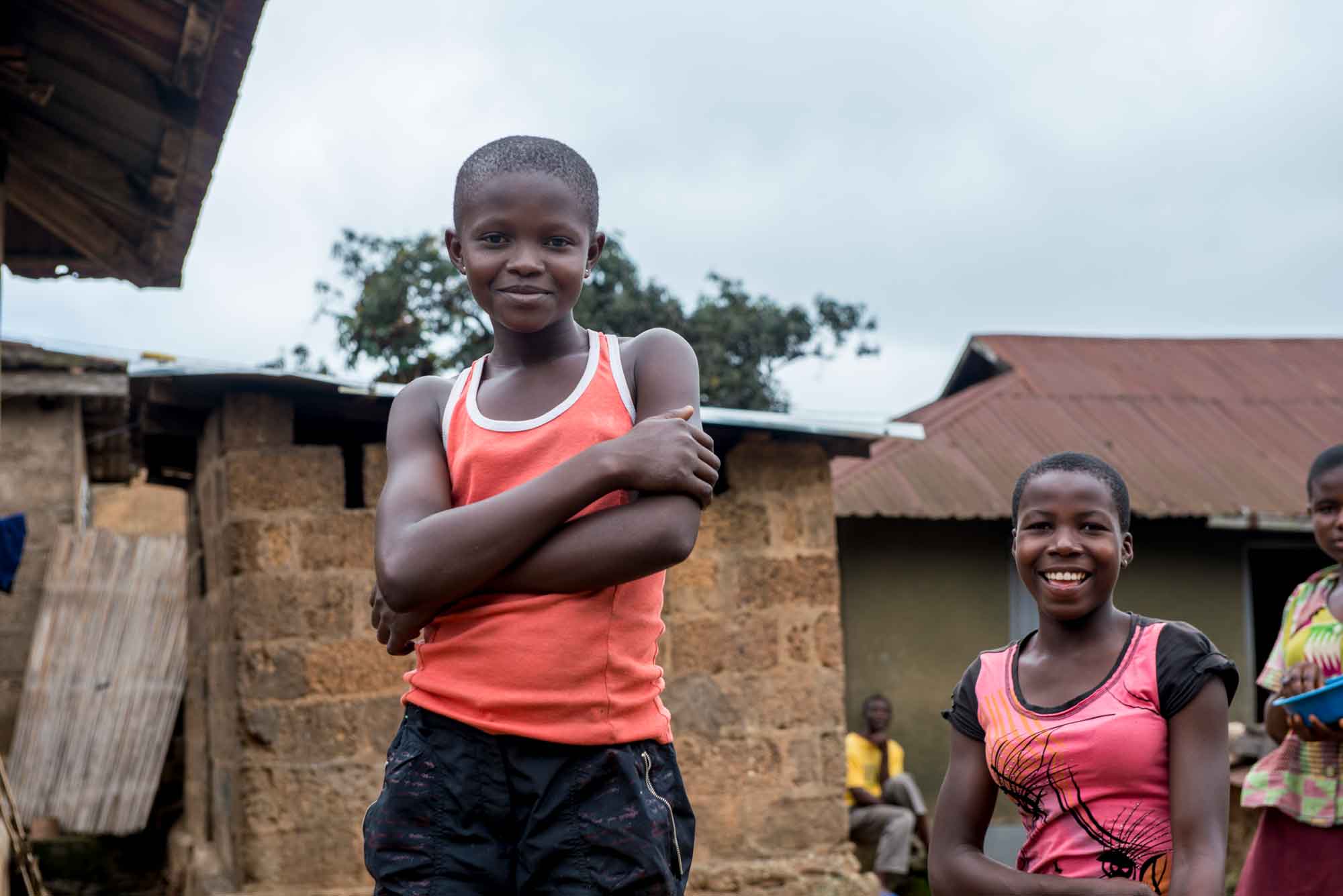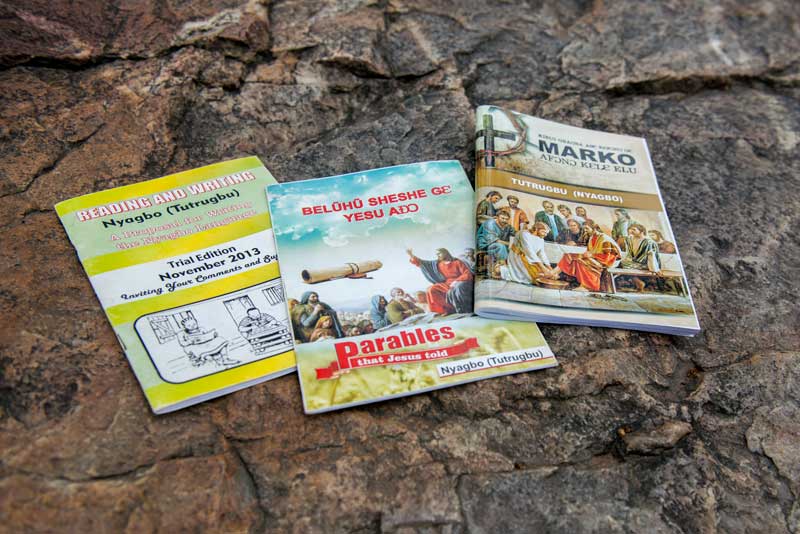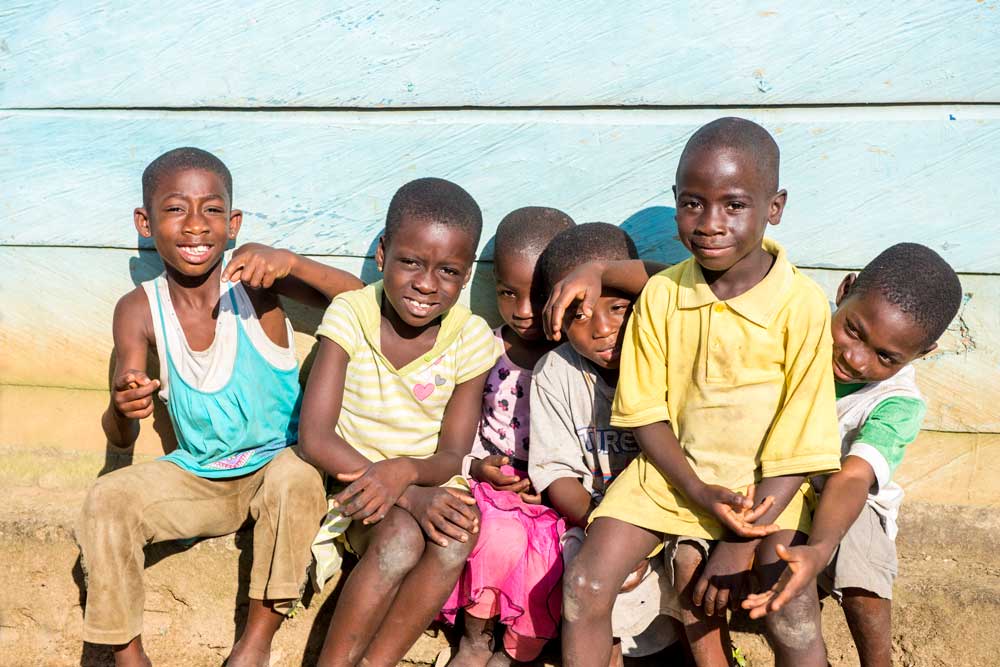A Translator for the Next Generation: Lucas' Story

In the middle of a stunning mountaintop village in Ghana, a modest-sized house overlooks a courtyard. A warm breeze drifts in from the open doorway, rustling the patterned curtain that hangs over the entryway.
It’s the end of September in West Africa, so a tiny fan does its best to cool the room down in the mid-afternoon heat. Stacked on a table near the door are individual bags of water, and the young man who lives there tears the corner off one before drinking it, offering me and my colleague the other bags. Then he gets back to work.

The sewing machine whirs loudly, and Lucas Jebbey focuses on completing the school uniform commissioned by the local senior high school. As I sit, I look around the rest of the house. An assortment of chairs sit along one wall, and multiple sewing machines line the L-shaped table at which Lucas is currently working.
Fabric and completed uniforms are stacked on couches nearby. In the opposite corner of the room, an electric guitar is propped up next to a weathered bookshelf with copies of Bibles and scrap paper containing notes and translation work.
In this short visit, I learn how this modest young man with a bright professional future found his purpose in the village of Nyagbo Sroe.
An Unexpected Visit
Lucas only came to Nyagbo Sroe to visit his ailing mother. But unbeknownst to him, that trip would become the beginning of his journey as a Bible translator.
In 2013 a team formed a full-scale Bible translation in the Nyagbo language, beginning with the parables of Jesus and assorted New Testament books.

An older man named Reverend Kwasi Bansah, who was part of the translation team, heard that Lucas had arrived in the village. Knowing Lucas had a degree in computer technology, the reverend paid him a visit to introduce the Bible translation project and talk about the software they were using. Rev. Bansah began to occasionally call on the young man to check things for him on the computer.
Not long after, one of the other translators — Reverend Joseph Ziangro — began to experience trouble with his eyesight. Soon he was unable to read the computer screen and do translation work because the cataracts in his eyes were so bad.
Knowing that Lucas had already helped them with computer work, Rev. Ziangro invited the young man to become a part of the translation team and type up things for him on the computer. Lucas was fascinated with the idea of a translation project in Nyagbo.
Changed By the Word
It’s natural to think of Bible translators as people who already have a grasp of the stories and meanings of biblical text. But that’s not always the case. Often, translators grow in their faith in Christ because of what they’re learning.
Lucas was a Christian before he joined the translation team. But when he first came to the village to visit his mother, he was all alone and didn’t attend church. As a result of his work on the translation team, Lucas’ understanding of the Christian life grew and he chose to become more involved in the local church.

One of Lucas’ favorite parables is the parable of the sower. Through translating the passage he was able to understand the significance of Jesus’ teaching about the Christian life — how Christians will always experience trials on earth but, instead of abandoning our faith, we have to rely on it in order to grow.
Lucas speaks several languages: English, Ewe and Nyagbo. He can communicate clearly in each of them. But only one speaks directly to his heart: Nyagbo. “Even when I translate the English into Nyagbo, I get the understanding more in the Nyagbo than English, even though I am the translator!”
Working For the Next Generation
Lucas could be doing anything he’d like with his degree and has several passions. He used to record his own music. And he’s opening a business in the city to make Ghanaian clothing to sell in South Africa.
With his array of talents and experience, I asked Lucas why he chose to participate in the work of Bible translation. He answered by telling me, “We are all living in this world with the hope that we inherit a kingdom one day after this life, so I became fascinated with the Word of God more than any other thing. And so, I became a translator.”
Lucas’ relationship with God has deepened as a result of being a part of the translation team.


Translation to Transformation
More than anything though, Lucas wants people to really hear God’s Word.
One afternoon, the Wycliffe team that was visiting Nyagbo Sroe climbed a set of stone steps to a hilltop church. Sitting outside of the church with the translation team and some local reverends, we paused for lunch in between conducting our interviews.
We passed around a travel container of white rice and chicken, and dug into a basket of bananas that the people of Nyagbo Sroe gave us. While we ate, we talked about the changes they’ve seen within the church as a result of Scripture in Nyagbo.
He observed that where people previously fell silent (or even fell asleep), Scripture readings now produce joy. People clap and are excited. They perk up and even occasionally respond to what the preacher is saying. After the launch of the Gospel of Mark, people came up to Lucas and gave him encouragement about the work and the progress of translation in their own language.
What was even more surprising were the phone calls he received.
Calls came in from outside the village to the translation team. These people had seen videos of the launch of the Gospel of Mark online. They commended the team for translating Scripture into Nyagbo, and they wanted to learn more about what was happening with the work in the village. Some even called Lucas and told him that they wanted to be there for the launch of the Nyagbo New Testament — whenever that happened.

Lucas’ hope is that the Nyagbo language will continue to be used in schools and churches throughout Nyagbo-speaking regions.
Sitting in Lucas’ house, I thought about what it would be like to grow up and never see your own language written down anywhere. I wondered how I would feel if someone presented me with a book of familiar words — words that formed stories, parables and teachings about a man named Jesus. What would Scripture in my language feel like? What emotions would bubble up within me?
And how would I respond to the God who spoke Nyagbo?
Generations of Nyagbo speakers will now have access to the Word of God in their language. And you can make a difference in the lives of people around the world who are still waiting for Scripture.






